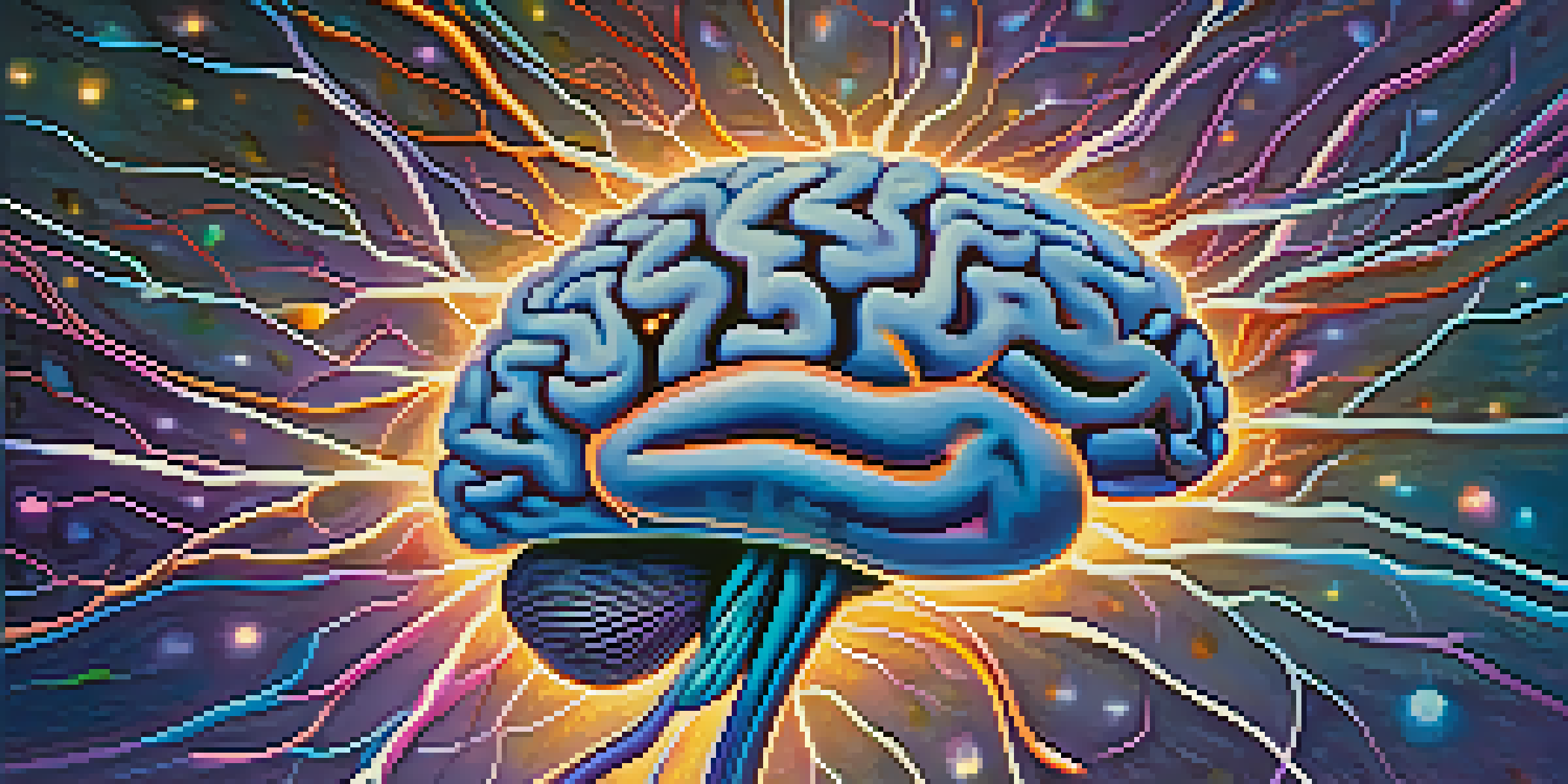Psychedelics and Depression: A Revolutionary Approach

Understanding Depression: A Complex Challenge
Depression is more than just feeling sad; it's a complex mental health disorder that affects millions worldwide. Symptoms can vary widely, from persistent sadness and lack of interest to physical ailments like fatigue and sleep disturbances. This complexity makes finding effective treatments a challenge, as traditional therapies don’t work for everyone.
The mind is everything. What you think you become.
For many, conventional options like antidepressants and psychotherapy provide relief, but they can also come with side effects or fail to work entirely. This has led researchers and patients alike to seek alternative solutions that might offer hope where traditional methods fall short. Enter psychedelics, which are gaining attention for their potential in treating depression.
By understanding the nuances of depression, we can appreciate why exploring innovative treatments, like psychedelics, is so crucial. The journey towards healing can often feel overwhelming, but recognizing the complexity of this disorder is the first step in identifying new paths for recovery.
Psychedelics: What Are They?
Psychedelics are substances that can alter perception, mood, and cognitive processes. Common examples include psilocybin (found in magic mushrooms), LSD, and ayahuasca. While they have been used for centuries in various cultures for spiritual or healing purposes, recent scientific interest has sparked a resurgence in their potential therapeutic applications.

These substances work by interacting with the brain's serotonin receptors, leading to alterations in consciousness and emotional experiences. This can facilitate profound insights or emotional catharsis, which may be particularly beneficial for those grappling with depression. The idea is that these experiences can help individuals break free from negative thought patterns.
Psychedelics Offer New Hope
Research shows psychedelics like psilocybin may provide effective and rapid relief for depression, unlike traditional treatments.
Understanding what psychedelics are and how they function is essential as we explore their role in treating depression. As stigma surrounding these substances diminishes, more people are becoming open to the idea that they might hold the key to emotional healing.
The Science Behind Psychedelics and Depression
Recent studies have shown promising results regarding the efficacy of psychedelics in treating depression. Research indicates that psilocybin, for example, can lead to significant reductions in depressive symptoms after just a few doses. This is particularly noteworthy given that traditional antidepressants often take weeks to show effects.
The greatest discovery of my generation is that a human being can alter his life by altering his attitudes of mind.
The rapid impact of psychedelics on mood may be attributed to their ability to promote neuroplasticity, which is the brain's capacity to form new connections and pathways. This means that psychedelics could help individuals reshape negative thinking patterns that contribute to their depression. The process can feel like hitting a mental reset button.
As more research unfolds, the scientific community is beginning to recognize the potential role of psychedelics in mental health treatment. This could pave the way for new therapies that are more effective and faster-acting than current options, ultimately changing the landscape of depression treatment.
Clinical Trials: A Glimpse into the Future
Clinical trials exploring psychedelics for depression are gaining momentum, with several studies yielding encouraging results. Institutions like Johns Hopkins University and Imperial College London are at the forefront, examining the effects of psilocybin and other psychedelics in controlled settings. These trials often combine psychedelics with therapy, enhancing the overall healing experience.
Participants in these trials frequently report profound emotional breakthroughs and lasting changes in their outlook on life. Many describe feelings of connection, peace, and even spiritual awakenings during their experiences, which can have a lasting impact on their mental well-being. This highlights the importance of a supportive environment when using psychedelics therapeutically.
Personal Experiences Matter
Testimonials highlight the transformative potential of psychedelics in therapeutic settings, emphasizing the importance of support during the healing journey.
As these trials continue, they not only provide scientific insight but also help destigmatize the use of psychedelics in mental health treatment. The hope is that successful outcomes will lead to more widespread acceptance and integration of these substances into standard depression treatments.
Challenges and Considerations in Psychedelic Therapy
Despite the promise of psychedelics, there are challenges and considerations that must be addressed before they can become mainstream treatments for depression. For one, the legality of these substances varies widely across regions, complicating research and access. This legal gray area can create barriers for individuals seeking help.
Additionally, the psychedelic experience can be unpredictable, and not everyone will respond positively. Some individuals may experience anxiety or discomfort during their sessions, which underscores the importance of having trained professionals guiding the process. Safety and support are paramount in ensuring a beneficial experience.
Navigating these challenges requires ongoing dialogue and research. As we continue to explore the potential of psychedelics, it's essential to prioritize safety, ethics, and accessibility to ensure that these innovative treatments can help those in need without undue risk.
Personal Stories: Healing Journeys with Psychedelics
Personal testimonials from individuals who have used psychedelics to address their depression can be incredibly powerful. Many report transformative experiences, where they have gained new perspectives on their struggles and found a renewed sense of hope. These stories often emphasize not just the substance, but the therapeutic setting and support they received.
For example, someone might share how a guided psilocybin session helped them confront deep-rooted traumas, leading to emotional release and healing. These narratives highlight the potential for psychedelics to facilitate profound personal insights that can be life-changing. They remind us that healing is often a deeply personal journey.
Future of Psychedelics Is Bright
Ongoing research and growing acceptance suggest psychedelics could revolutionize mental health treatment, focusing on holistic approaches.
These personal stories are crucial for understanding the human side of psychedelic therapy. They serve to inspire others who may be suffering, showing that new avenues of healing are possible and encouraging open discussions about mental health and alternative treatments.
The Future of Psychedelics in Mental Health Treatment
As research continues to unfold, the future of psychedelics in treating depression looks promising. With growing acceptance and understanding, we may see these substances integrated into mainstream mental health practices. This shift could revolutionize how we approach mental health treatment, focusing on holistic, patient-centered care.
Moreover, advancements in technology and research methodologies are paving the way for more comprehensive studies. As we learn more about the mechanisms at play, we can refine therapeutic approaches, ensuring better outcomes for patients. This evolution in mental health treatment is exciting and full of potential.

Ultimately, the future of psychedelics in mental health treatment depends on continued advocacy, research, and education. By fostering a culture of understanding and openness, we can ensure that those suffering from depression have access to all available resources, including these innovative therapies that might make a significant difference in their lives.